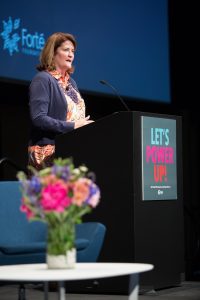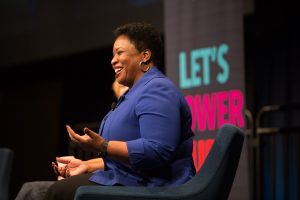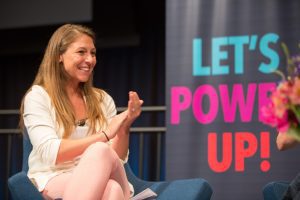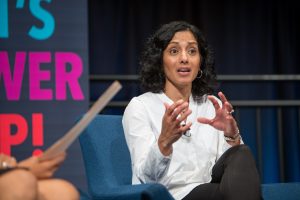Every year, hundreds of women MBA candidates from around the United States gather before their first semester to attend the Forté Foundation MBA Women’s Leadership Conference. This year–the 10th anniversary of the event–the sold-out conference took place in Seattle, Washington on June 16th and 17th.
About the 2017 MBA Women’s Leadership Conference
Run by the Forté Foundation, a non-profit focused on promoting gender diversity among MBAs and helping women start careers in business, the annual, invitation-only conference provides support to women MBA students before they even set foot on campus by providing insight into their career options and offering advice for success.

Elissa Sangster, Executive Director, Forté Foundation welcomes attendees to the Forté MBA Women’s Leadership Conference
Elissa Sangster, the executive director of the Forté Foundation, said in an interview: “The conference has always been a great place for women to begin building their network before their MBA. Our attendees feel the energy, the enthusiasm, and the excitement. Very often they’re coming from careers or industries where they may have felt very alone throughout the MBA process. So, the experience of showing up at a conference with close to 100 percent women who are all pursuing the same goal of an MBA and their future careers is very empowering.”
Throughout the two-day conference, participants attend speaker sessions, presentations, and dialogues covering a range of topics from LGBT issues to bridging the gender gap. This year, some of the speakers included:
-
- Claire Shipman: a women’s leadership expert, news reporter, and New York Times best-selling author of the Confidence Code,
- Ann-Marie Campbell: the executive vice president for U.S. stores at Home Depot,
- Aimee Johnson: the senior vice president of customer relationship management at Starbucks, and
- Susan Ershler: a mountain climber, former business executive, and author of Together on Top of the World.
There’s also a Power Pitch Competition, in which women MBAs present business ideas to a panel of judges. We’ll be discussing this competition in a future article.
We spoke with Sangster to learn more about the conference and what it provides to attendees. Here’s what she had to say.
Clear Admit: Can you give a brief overview of some of the highlights you experienced at the Women’s Leadership Conference?
Sangster: Our first big “ah-ha” moment was when we realized how many women we actually had in attendance. We’re traditionally in the mid-400s, and this year we sold out within a month of the conference and had over 600 women attend. Then, we had 200 women on the waitlist. We were shocked by how many women signed up and showed up.
We had some wonderful speakers and presentations. Claire Shipman, who is a journalist and author, opened up the conference talking about her book The Confidence Code, which she had written with Katty Kay. It was a wonderful way to kick off the conference with some amazing statistics, research studies, and storytelling.
Also, one of the things we try to do at the conference is to give women exposure to all the different industries that MBAs pursue—anything from financial services to corporate finance, consumer packaged goods, entrepreneurship, etc. We give attendees a chance to talk to women in the field and to learn from them about how they got from their MBA to their current position. It’s wonderful for women to get to do this before their first day on campus.
Then, we have a career fair, which isn’t a traditional career fair because our goal isn’t to get women hired for an internship. Instead, our goal is to help women explore and learn about industries, talk to companies, hear about opportunities, and start building relationships.
On Saturday, the women go into more sessions for professional development. We host workshops on a range of topics. We held a session on the “Future of Feminism,” which was well received. There were lots of really honest conversations and positive messages about supporting women. We also held a session on the LGBT community and the intersection between being a woman and sexuality.
We also bring in workshop leaders to talk about specific topics such as communication and negotiation. There was a session on case discussions in the classroom and how women can advance their ideas and prepare to give their classmates the best foundation for the conversation. There were also a lot of topics around what’s going to make you successful in your MBA program and what’s going to make you successful as an MBA in a career.

Ann-Marie Campbell, executive vice president, U.S. stores, Home Depot, speaks during the “Dialogue with Leadership” panel at the Forté event
CA: What makes the MBA Women’s Leadership Conference stand out from other events?
Sangster: The timing of our conference is unique. It is meant to be that first step as you enter into an MBA program. We do have some returning second years, but it’s 75 percent women who haven’t stepped foot on campus to start classes. The conference is a springboard. We really get to see the women first; we get to welcome them to the MBA world. It’s a great way to start connections in a very safe and not hectic environment. That’s what the women value.
It’s also a great group of women that attend the conference. Because of our relationships with our schools as well as the types of schools Forté partners with, we have a very impressive, top-notch group of women. It is invitation only, so you have to be attending one of our schools to join us.
CA: Was there one speaker, discussion panel, or experience that really stood out this year? Why?
Sangster: I personally thought Claire Shipman was the most interesting because of her stories and understanding of the whole background of where we gain confidence and how we build our own confidence. She shared stories that were so real and shocking about what happens with both men and women and how confidence progresses. Her talk was very insightful.
We also had two CFOs—one from Amazon and one from Imperial Oil Limited—and one CMO from Alaska Airlines. It was a great look at what those leaders at the C-Suite level are thinking about—what drives their thoughts, what is it they see in their organization for gender equality, and what women need to be thinking about if they aspire to those roles.

Tiffany Niver, senior manager, product management, Amazon, moderates the “Dialogue with Leadership” panel
Clear Admit: Over the last 10 years, what has been the biggest change or greatest achievement of the conference?
Sangster: The first year, probably 60 MBA women and 200 undergrads attended the one-day conference. Now, we have a great number of attendees—it’s grown 10 times in 10 years—and we hold the conference for two days.
We’ve also changed the format. We didn’t have industry panels the first year because we didn’t have enough company connections. Now, we can deliver that deep-dive into those different functional areas. We are also able to diversify the types of sessions we offer. We’re having more nuanced conversations, which allows us to address niche needs.

Sangita Woerner, vice president, marketing, Alaska Airlines, speaks during the “Deepen the Dialogue: Perspectives from the C-Suite” panel at the Forté event
The funny thing is that the food never seems to change. There’s always one meal that isn’t good but the rest of them are great. The same thing happened this year. There’s always something that isn’t perfect.
Clear Admit: Why should a woman MBA student attend next year?
There are two main reasons to attend the conference:
-
- First: To meet women and build friendships.
- Second: To utilize the quiet time before the start of school year to dig deeper into your career aspirations, so that you’re not having to deal with that on campus.
Until you get to business school and sink into the culture, you don’t have a lot of opportunities to meet the women you’re going to school with and to learn what the broader MBA picture looks like. The conference is a great chance to do this before you’re on campus. There’s so much preparation that you can do to make your semester go smoothly if you go to a conference like ours and start thinking about the MBA early.
Header Photograph by Matt Hagen: More than 700 businesswomen and female MBA students attended the Forté MBA Women’s Leadership Conference
This post has been republished in its entirety from its original source, metromba.com.




